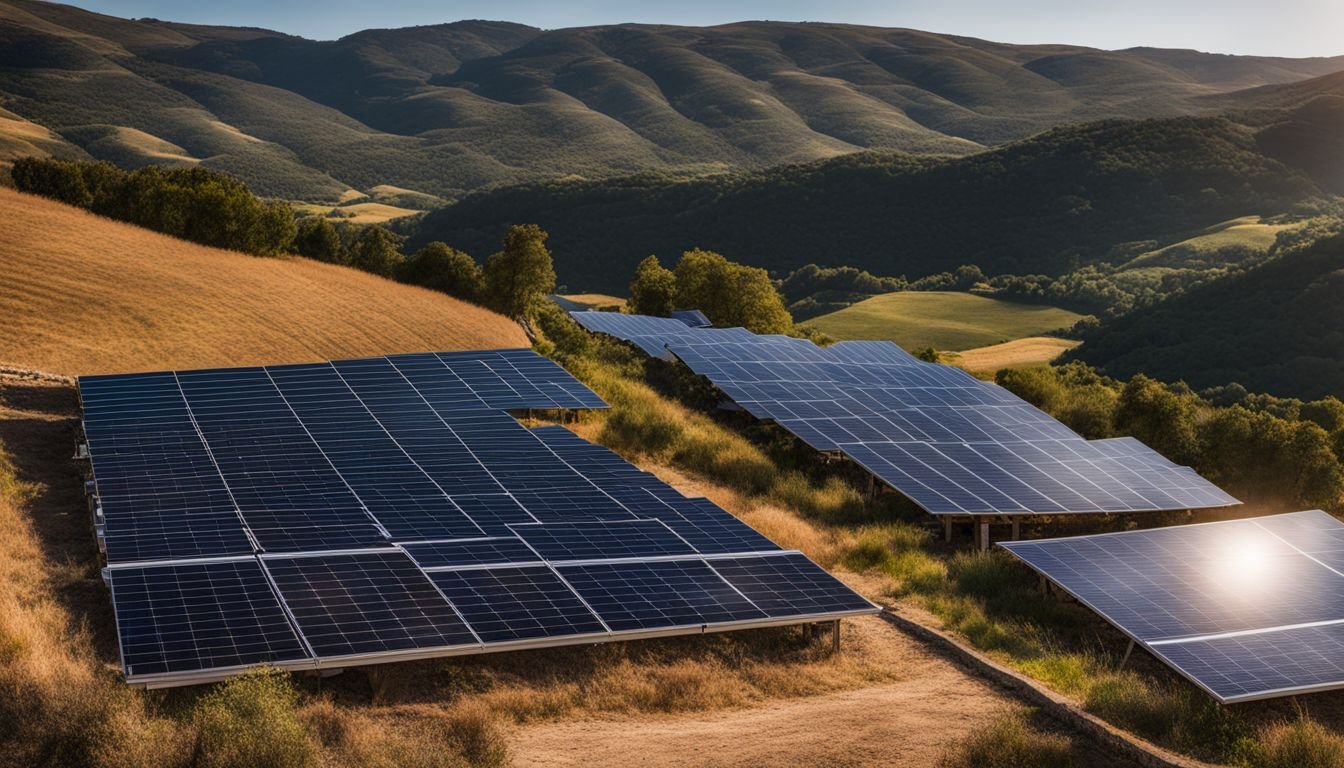Eco-tourism and sustainable travel in Costa Blanca
More people want to travel in ways that are good for the Earth. Agriturismo Refugio Marnes in Costa Blanca has been leading the way in eco-friendly vacations for almost 20 years.
This article will tell you about travel options that are kind to the environment in this lovely place. You will learn about spots where staying helps the Earth. Let’s get ready to travel green!
Advancements in Sustainable Tourism in Spain

Sustainable tourism in Spain has seen significant advancements, with a growing emphasis on reducing CO2 emissions and preserving the natural beauty and cultural heritage of destinations.
The role of Costa Blanca tour services has become pivotal in advocating responsible tourism practices and promoting sustainable energy sources, including solar power and renewable energy.
Role of Costa Blanca Tour Services
Costa Blanca Tour Services S.L. plays a vital part in Benidorm’s journey towards sustainable tourism and the preservation of its stunning natural beauty. This company has made a commitment to responsible tourism, working closely with local authorities to advance practices that respect both the environment and cultural heritage.
Through offering eco-friendly transportation options, they help reduce CO2 emissions, aligning with global efforts to combat climate change.
The organization also takes proactive steps in promoting sustainable mobility within Benidorm by supporting the development of bike lanes and pedestrian zones. These initiatives not only contribute to reducing the reliance on petrol and diesel vehicles but also encourage tourists and residents alike to embrace healthier modes of transport.
Such efforts underscore Costa Blanca Tour Services’ role in fostering an environmentally friendly public transportation system that benefits everyone in the community while safeguarding the region’s picturesque landscapes for future generations.
Importance of Environmental Sustainability in Costa Blanca

Environmental sustainability in Costa Blanca plays a crucial role in the region’s future, especially as it navigates the challenges of global warming and energy production. With Spain meeting 45.8% of its electricity needs from renewable sources, Costa Blanca is at the forefront of this energy transition.
The commitment to solar power, demonstrated by properties like Agriturismo Refugio Marnes being 99% solar powered, underscores the area’s dedication to reducing its carbon footprint.
This shift not only supports cleaner energy but also promotes off-grid living that lessens the impact on the environment.
In addition to harnessing renewable energy sources, Costa Blanca has made significant strides in water conservation and waste reduction. Benidorm’s success in cutting water consumption by 15.2%, despite growing tourist numbers, serves as a testament to efficient resource use through innovative projects like Dinapsis.
These efforts reflect a broader movement towards environmental stewardship across Comunidad Valenciana, protecting nature tourism attractions while ensuring a sustainable future for local communities and the wider tourism industry.
Impact on Local Communities and Economy
Eco-tourism and sustainable travel initiatives significantly boost local economies in Costa Blanca, as evidenced by the success of Benidorm. The diversification of its tourism sector has created 40,000 jobs, offering a wide range of opportunities for residents.
These jobs span from hotel and tour service positions to roles supporting the burgeoning wine tourism scene. Sustainable practices within these industries also encourage infrastructures to shift towards alternative energy sources such as solar panels, further stimulating economic growth through new technologies and services.
The positive effects extend beyond job creation; they foster community development and environmental health. Benidorm’s commitment to reducing water consumption by 15.2% between 1997 and 2019 showcases how sustainable measures can coexist with urban growth without depleting local resources.
By investing in projects like Dinapsis for smart water management, communities see firsthand the benefits of conserving their environment while enhancing their quality of life. This careful balance between development and sustainability encourages a healthier economy where both people and nature thrive together.
Highlighting Eco-friendly Places to Stay in Costa Blanca
Looking for eco-friendly places in Costa Blanca? Here are some top picks:
- Agriturismo Refugio Marnes: Offers sustainable holidays for 18 years, powered by 99% solar energy and recycles 85% of its waste. It saves water through rainwater collection and waste water recycling.
- Sustainable Landscape Management: Focuses on innovations in alternative energy systems.
- Encouraging European Destinations: Promotes sustainable tourism in Europe to reduce CO2 emissions.
- Transportation Options: Accessible by car, train, or bus, reducing the need for air travel.
- Alternative Travel Information: Provides information on alternative forms of travel and conservation.
Exploring Fishing Villages and Maritime Excursions in Costa Blanca
Costa Blanca is home to picturesque fishing villages and offers a range of maritime excursions that allow visitors to engage with the region’s rich maritime heritage. Here are some curated experiences for eco-conscious travelers:
- Discover the quaint fishing village of Altea, known for its charming whitewashed houses and cobbled streets. Engage in sustainable fishing experiences with local fishermen and learn about traditional fishing practices passed down through generations.
- Embark on a guided eco – friendly boat tour from Denia, exploring the stunning coastline while learning about marine conservation efforts in the area. Keep an eye out for local wildlife, such as dolphins and sea turtles, with expert guides emphasizing the importance of responsible tourism.
- Visit Javea’s historic port and delve into its maritime history through interactive tours at the Fishermen’s Museum. Gain insights into sustainable fishing methods, including selective gear techniques employed by local fishermen to preserve marine ecosystems.
- Explore Calpe’s fish auction market and witness the bustling trade in fresh catches from the Mediterranean Sea. Engage with local vendors promoting sustainable seafood consumption and participate in educational workshops on supporting responsible fishing practices.
- Take part in hands-on experiences at Moraira’s nautical club, where visitors can join eco-conscious sailing excursions or try paddleboarding along the ecologically diverse coastline under the guidance of knowledgeable instructors advocating for ocean conservation.
Exploring these fishing villages and engaging in maritime excursions provide an immersive experience that fosters a deeper understanding of Costa Blanca’s commitment to environmental sustainability, offering travelers unique opportunities to support local communities while preserving natural resources for future generations.
Conclusion: Future of Sustainable Travel in Costa Blanca
The future of sustainable travel in Costa Blanca looks promising, with advancements in eco-tourism gaining traction. Visitors to the region are increasingly choosing environmentally-friendly accommodations and transportation options.
Local initiatives and a commitment to renewable energy sources underpin the shift towards more sustainable tourism practices. These developments not only benefit the environment but also contribute positively to the local communities and economy, making it a win-win situation for everyone involved.
As travelers become more conscious of their environmental impact, Costa Blanca is poised to continue leading the way in sustainable tourism practices.
For an in-depth look at the serene beauty and sustainable experiences offered by local fishing villages, be sure to explore our guide on Fishing Villages and Maritime Excursions in Costa Blanca.
FAQs
1. What makes Costa Blanca a great destination for eco-tourism?
Costa Blanca stands out as an eco-friendly tourist destination because it promotes sustainable travel practices, such as using electric cars and avoiding plastic straws to protect the environment.
2. Can I find off-grid accommodations in Costa Blanca?
Yes, you can find places to stay in Costa Blanca that are off the electricity grid, offering a unique experience powered by alternative sources of energy like solar or nuclear energy.
3. Are there environmentally-friendly ways to explore Costa Blanca?
Absolutely! Tourists can enjoy exploring Costa Blanca through environmentally-friendly options like electric cars, which reduce carbon emissions and help preserve the area’s natural beauty.
4. How does Costa Blanca support sustainable travel?
Costa Blanca supports sustainable travel by encouraging the use of renewable energy sources and providing facilities for tourists to travel with minimal environmental impact, making it an ideal spot for those who love nature and want to keep their carbon footprint low.







